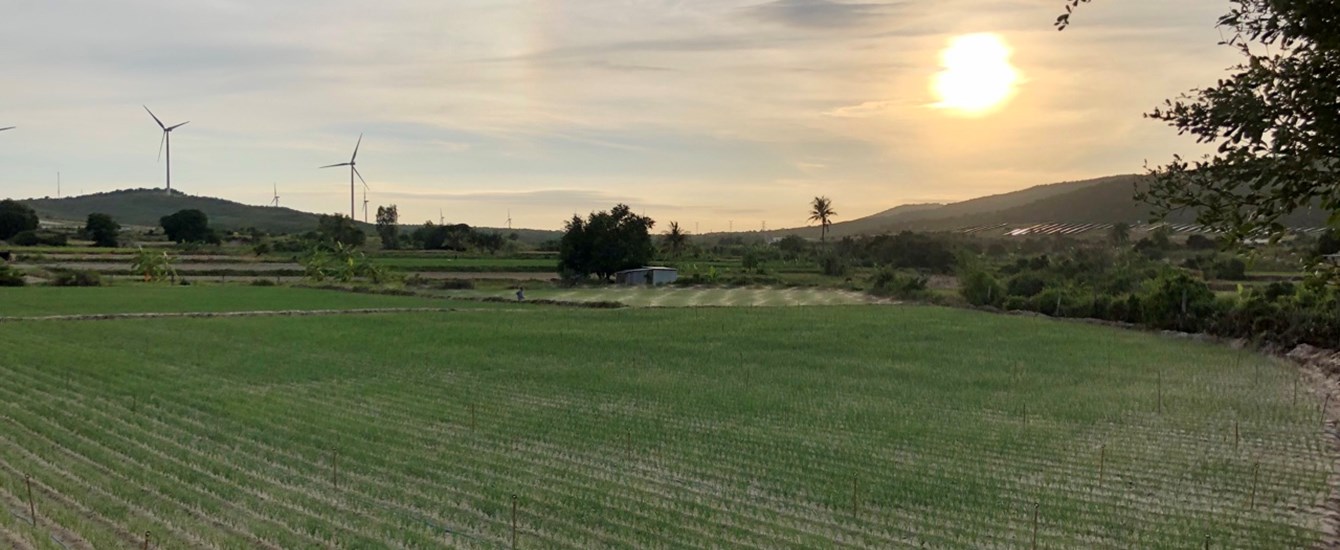
Photo credit: Ngan Vu, Vietnam
Given the potential for climate change to destabilize the global economy, the Financial Stability Board’s Task Force on Climate-related Financial Disclosures (TCFD) was established to enhance information to investors, lenders and insurers so that the risk, and opportunity, is recognized, assessed and priced in.

Although ERM has published TCFD indexes in our Sustainability Report for FY19 and FY20, this year we also released our first stand-alone TCFD disclosure. For more information, see the TCFD reporting section of this report.
The following index provides links to ERM’s disclosures on climate-related risks and opportunities as recommended by the TCFD. We also provide separate GRI and UN Global Compact indexes.
Governance
| Disclosure | Link | Additional information |
| Describe the board's oversight of climate-related risks and opportunities. | Governance & strategy Sustainability at ERM Business conduct & ethics |
ERM’s Board of Directors and Executive Committee are ERM's highest governing bodies. They are responsible for the strategic direction of the organization and the effective monitoring of climate change performance. The Board of Directors is responsible for the direction and oversight of ERM Worldwide Group Limited (as parent company of the ERM Group) on behalf of our stakeholders, including shareholders. The Board meets at least six times per year to review performance and consider key strategic growth plans, which includes, where relevant, the impact of climate-related issues on ERM’s strategy. In addition, Board subcommittees provide oversight of audit, risk and remuneration. The Board delegates its authority for the executive management of the Group to the Group Chief Executive Officer and, through her, to the Executive Committee (subject to defined limits and monitoring by the Board).As one of ERM’s material sustainability topics, we integrate climate-related risk and the low carbon economy transition (LCET) into our business strategy for the marketplace as well as how we manage our own operations. |
| Describe management's role in assessing and managing climate-related risks and opportunities. | Governance & strategy Sustainability at ERM Business conduct & ethics Climate-related risk |
ERM’s Executive Committee members are responsible for the strategic and operational leadership and management of the business and its subsequent management of climate related financial risks and opportunities. The Executive Committee meets monthly to discuss operational performance and to ensure key strategic responses to climate-related financial risk and opportunity are being implemented effectively. ERM has an Executive Committee Working Group that focuses specifically on ERM’s sustainability performance and reporting, including the company’s approach to climate risk. Additionally, an Executive Committee LCET Steering Committee was established in 2019 to govern ERM’s response to implementation of our LCET revenue growth strategy. A Senior Leadership Team (SLT) Working Group comprising senior operational and technical leaders from across the business provides oversight and guidance on the implementation plan to meet ERM’s science-based reduction targets for 2025. The SLT Working Group reports to the Executive Committee Sustainability Working Group on a regular basis. |
Strategy
Disclose the actual potential impacts of climate-related risks and opportunities on the organization's businesses, strategy, and financial planning where such information is material.
| Disclosure | Link | Additional information |
| Describe the climate-related risks and opportunities the organization has identified over the short, medium, and long term. | CEO message Climate-related risk Low carbon economy transition |
Climate-related financial risk is a material topic for ERM. Our comprehensive approach to sustainability is embedded in our corporate strategy with a stated purpose to "shape a sustainable future with the world’s leading organizations." A sustainable future is aligned with the 2030 ambition of the Sustainable Development Goals and the Paris Agreement on Climate Change. Our focus on sustainability, our range of services, and our “boots to boardroom” approach ensures that we can work alongside clients to address their most pressing challenges and opportunities, whether they require focused technical attention or full top-to-bottom strategy and solutions. |
| Describe the impact of climate-related risks and opportunities on the organization's businesses, strategy, and financial planning. | CEO message Climate-related risk Low carbon economy transition |
ERM works with clients in high emitting sectors (such as mining and metals, oil and gas and chemicals). Increasingly projects involve helping these clients with their transition to a lowcarbon economy. As investors and regulators have ramped up pressure on companies with respect to climate-related disclosure and commitments, demand is growing for our services. To accelerate ERM’s ability to service clients in the transition to a lower carbon economy, ERM has a strategic focus on developing services that meet the evolving needs of our clients. In addition, ERM has an acquisitions program to catalyze our positioning in climate-risk and LCET related services in key geographies, sectors and services. In recent times, we have brought in expertise through the acquisition of Michael J Bradley and Associates in North America, and Arcus, Sustainalize and E4Tech in Europe. A strategic hiring program to attract leading technical, digital and commercial experts to accelerate our ability to support clients’ climate change strategies complements a program of capability building within our existing technical communities. ERM actively engages our clients on the impacts of a transition to a low carbon economy. ERM acknowledges the ongoing emissions associated with our projects and clients. We recognize that our client base includes companies in energy-intensive sectors that play an important role in society. We are supporting these companies so they may thrive in a decarbonized world. Our clients need our skills and expertise to set bold targets, deliver against these targets and transition to business models which are compatible with and will succeed in a decarbonizing economy. We will continue to invest resources into building our capability and capacity to support our clients’ LCET needs. Our services focus on working with clients as they transition to a low carbon future and include: advising at corporate and asset levels to evaluate and respond to climate-related (transition and physical climate change) financial risk and opportunity; creating net zero pathways that are scientifically robust, commercially viable and technically practicable – and that meet the needs of today’s ESG investors; building the trillions of dollars of "new energies" and lower-carbon infrastructure (e.g., renewables, electricity networks, liquid natural gas, hydrogen and carbon capture, utilization and storage); and helping close, clean up and regenerate redundant, high carbon assets and land for new uses in the low carbon economy. |
| Describe the resilience of the organization's strategy, taking into consideration different climate-related scenarios, including a 2°C or lower scenario. | Climate-related risk |
ERM will strengthen our disclosures over the coming years by undertaking scenario analysis of ERM’s sectors and services to identify climate-related financial risks and opportunities. We will leverage the deep expertise in this area which we have and which has to date been focused towards assisting our clients to evaluate their climate-related financial risks and opportunities associated with different transition pathways, or scenarios. |
Risk management
Disclose how the organization identifies, assesses and manages climate-related risks.
| Disclosure | Link | Additional information |
| Describe the organization's processes for identifying and assessing climate-related risks. | Sustainability at ERM Risk management Governance & strategy |
ERM manages climate change risks as part of our wider risk management process. We are in the process of updating our Enterprise Risk Management approach with a view to integrating the COSO ESG guidelines. This year we held an internal workshop to update the climate-related financial risks that will feed into ERM’s FY22 risk-review process. In FY20, ERM established a baseline for revenue from projects that contribute to the transition to a low carbon economy. We have set annual percentage growth targets to increase this revenue year-on-year. This represents an initial step to de-risk our business in the context of the global transition to a lower carbon economy. |
| Describe the organization's processes for managing climate-related risks. | Business conduct & ethics |
ERM exercises judgment with respect to clients and third parties it engages with and the types of work we undertake. ERM scrutinizes opportunities and projects carefully before proceeding, and reserves the right to withdraw from a project if business conduct, ethics or climate concerns arise. We have reviewed the physical risks resulting from changing patterns in climate-related weather events for our office locations. We assess the evolving impacts on fieldwork from a changing climate including impacts of extreme weather events, prevalence of species in new areas (e.g. ticks) and a greater focus on emergency response planning. |
| Describe how processes for identifying, assessing and managing climate-related risks are integrated into the organization's overall risk management. | Sustainability at ERM Business conduct & ethics |
As part of our approach to meeting greenhouse gas emission reduction targets, ERM is identifying short, medium and long-term risks and opportunities. |
Metrics and targets
Disclose the metrics and targets used to assess and manage relevant climate-related risks and opportunities where such information is material.
| Disclosure | Link | Additional information |
| Disclose the metrics used by the organization to assess climate-related risks and opportunities in line with its strategy and risk management process. |
Climate-related risk data |
Since 2020, ERM has set a public target to increase revenue from projects that contribute to the transition to a lower carbon economy. In the last financial year, we grew this area of business by 70% and have set a target for a further 50% growth in FY22. In April 2021, ERM announced a commitment to achieve net-zero emissions across our operations by 2025. To underpin this commitment we have submitted an updated science-based target from 2⁰ C to 1.5⁰ C by 2025. At the time of writing, we are waiting for Science Based Targets initiative to validate this target. To achieve 1.5⁰, we will address our direct and indirect emissions (known as Scope 1 and 2) by moving to 100% renewable energy across our global portfolio of offices starting in FY21, and further reduce emissions across our vehicle fleet. Value chain emissions (known as Scope 3) will be addressed primarily through a focus on reducing business travel. This year, organizational travel budgets have been reduced by 50% and a new travel policy is being implemented. Emissions from employee commuting will be addressed through reviewing office locations and rolling out incentive schemes to encourage lower carbon commuting options. While all efforts are being made to reduce emissions, ERM anticipates that in 2025 we will have a residual carbon footprint, largely related to business travel. To this end, ERM has made a public commitment to achieve net-zero emissions by 2025. ERM will draw on its extensive pool of subject-matter experts as well as emerging best practices to develop a robust and comprehensive plan to address residual emissions. This includes carbon removal and reduction as well as contributions to biodiversity and livelihoods. ERM is a signatory to the Ambition for a 1.5 Degree Future, The Climate Pledge and The Race to Zero. |
| Disclose Scope 1, Scope 2 and, if appropriate, Scope 3 greenhouse gas emissions and the related risks. |
|
ERM discloses the following data on the Climate-related risk data page: Total GHG emissions FY19 - FY21 SBT Scope 1 & 2 performance and trajectory FY14-FY25 |
| Describe the targets used by the organization to manage climate-related risks and opportunities and performance against targets. | Climate-related risk Net zero & science-based targets Targets, goals & performance results |
ERM has two companywide targets for FY22: 1. Remain on track to meet net-zero commitment and science-based targets of 30% reduction in Scopes 1 & 2 and 11% in Scope 3 emissions by 2025. 2. Increase sales supporting client's low carbon economy transition by 50% over FY21.
|
